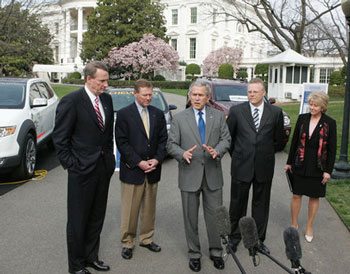 Our friends at “The Fueling Station” in St. Petersburg, Florida alerted us to an in-depth interview they did with biofuels venture capitalist Vinod Khosla.
Our friends at “The Fueling Station” in St. Petersburg, Florida alerted us to an in-depth interview they did with biofuels venture capitalist Vinod Khosla.
I did a post about this blog when they first got started in August of last year. Still love the name and the logo. The authors, St. Petersburg Times reporters David Adams and Craig Pittman, do a great job reporting on biofuels in the Sunshine State. That’s where they interviewed Khosla – he was in Orlando for the Biotechnology Industry Organization (BIO) conference.
In case you have never heard of Mr. Khosla, his company Khosla Ventures is investing heavily in new energy technology companies in the United States, as well as places like Brazil and India. An Indian-American, he was one of the co-founders of Sun Microsystems and has gone on to make a name for himself as a promoter of ethanol investments.



 The
The  “I first would say that I don’t think about using food for fuel. I think about using crops for fuel. I say that because this use has been an objective of agriculture for a long, long time. Henry Ford built a car out of plastic made from soybeans a long, long time ago. We’ve been trying to utilize agricultural commodities in industrial uses for decades precisely because the productive capacity of American agriculture has been so great. It’s often overwhelmed demand and created lower prices. That’s why we have this elaborate system of price and income support programs at USDA. So it’s not a new thing to use crops for fuel.”
“I first would say that I don’t think about using food for fuel. I think about using crops for fuel. I say that because this use has been an objective of agriculture for a long, long time. Henry Ford built a car out of plastic made from soybeans a long, long time ago. We’ve been trying to utilize agricultural commodities in industrial uses for decades precisely because the productive capacity of American agriculture has been so great. It’s often overwhelmed demand and created lower prices. That’s why we have this elaborate system of price and income support programs at USDA. So it’s not a new thing to use crops for fuel.” Rick Wagoner, Chairman and CEO, General Motors Corporation said that flex fuel vehicles offer the best opportunity right now for America to lessen its dependence on foreign oil. “There are millions on the road today. As a group, we’ve agreed to double our production by the year 2010, and then have 50 percent of our production E85-capable by the year 2012.”
Rick Wagoner, Chairman and CEO, General Motors Corporation said that flex fuel vehicles offer the best opportunity right now for America to lessen its dependence on foreign oil. “There are millions on the road today. As a group, we’ve agreed to double our production by the year 2010, and then have 50 percent of our production E85-capable by the year 2012.” Vegetable oil converted to motor-vehicle fuel is considered a biodiesel, which is taxable under state law, said Meredith Helgerson, spokeswoman for the Revenue Department.
Vegetable oil converted to motor-vehicle fuel is considered a biodiesel, which is taxable under state law, said Meredith Helgerson, spokeswoman for the Revenue Department. Ironically, this news comes after the
Ironically, this news comes after the  Montreal, Canada will run its entire bus fleet on biodiesel by 2008 and will buy eight hybrid buses to test in the city’s cold climate.
Montreal, Canada will run its entire bus fleet on biodiesel by 2008 and will buy eight hybrid buses to test in the city’s cold climate. All Société de transport de Montréal (STM) buses will run on biodiesel fuel by 2008, and the transition should be fairly inexpensive, said president Claude Trudel.
All Société de transport de Montréal (STM) buses will run on biodiesel fuel by 2008, and the transition should be fairly inexpensive, said president Claude Trudel. Seattle-based Imperium Renewables, ready to put the country’s largest biodiesel plant into operation and holder of the record for investment in a biodiesel company (see my posts on
Seattle-based Imperium Renewables, ready to put the country’s largest biodiesel plant into operation and holder of the record for investment in a biodiesel company (see my posts on  The official name for Saturday’s IndyCar Series opener may have been the XM Satellite Radio Indy 300, but on
The official name for Saturday’s IndyCar Series opener may have been the XM Satellite Radio Indy 300, but on  Here’s the winner of the first Indy car race of the year, Dan Wheldon. It’s the third time in a row that Dan has won the race. He did it in dominating fashion too and afterward said it was a lot of fun running the race.
Here’s the winner of the first Indy car race of the year, Dan Wheldon. It’s the third time in a row that Dan has won the race. He did it in dominating fashion too and afterward said it was a lot of fun running the race.